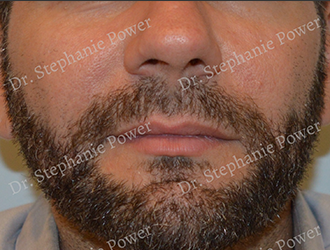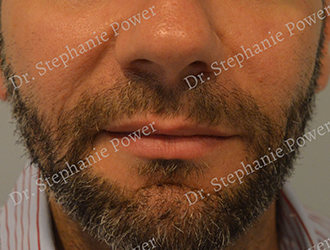If you’re beginning to notice early signs of facial aging – perhaps loss of volume of your cheeks, deepening of your smile or marionette lines – or simply wish to augment your natural facial features, soft tissue fillers may be right for you. Filler injections are a non-invasive cosmetic treatment that may address lines and wrinkles and loss of youthful facial fat. They may also be performed to add volume to natural lip and cheek contours to achieve your desired look. As a non-surgical cosmetic procedure, there is little to no downtime. Treatment plans are tailored for each patient based on your aesthetic goals and clinical presentation.
What are Soft Tissue Fillers?
Soft tissue fillers, also known as dermal fillers or injectable fillers, are a non-surgical option to restore facial volume and to enhance facial rejuvenation. There are different types of fillers. Dr. Power most commonly recommends hyaluronic acid fillers, which are temporary, reversible, and have a reliable safety profile. Hyaluronic acid is a substance that occurs naturally in the body and binds to and retains water. Common sites for application include the cheekbone regions (malar eminences), marionette lines (extending from the corners of the mouth), nasolabial folds (smile lines), and jowl regions. Fillers may also be used for lip and temple augmentation, correction of shallow wrinkles and creases, and for contour improvement of depressed scars.
Hyaluronic Acid Fillers
Dr. Power most commonly recommends fillers from the Juvéderm Vycross line. These fillers utilize the latest technology in crosslinking, which leads to longer-lasting results, less swelling, and better lift effect. Juvéderm Vycross products include:
- Juvéderm Voluma®: For cheek augmentation, lasting up to 2 years.
- Juvéderm Volift®: For smile lines, correction up to 15 months.
- Juvéderm Volbella®: For lips and tear troughs, lasting up to one year.
Fat Transfer Injections
Dr. Power also performs fat injections, which may provide similar results to injectable fillers. Fat transfer is a surgical procedure that uses your own fat stores. Although the downtime is slightly longer than for non-surgical fillers, results may be more long-lasting.
The best candidates for soft tissue fillers are physically healthy with well-defined aesthetic goals. Pregnant or breastfeeding women should defer treatment with dermal filler injections. Consultation with Dr. Power is the best way to determine candidacy.
How is Soft Tissue Filler Treatment Performed?
The treatment area determines the type and depth of filler injections. A filler that is more fluid-like (low viscosity), for example, is used to correct superficial fine lines around the lips. A more viscous filler is used for cheek augmentation for more structural support, which is injected deeply adjacent to the cheekbone. Prior to treatment, a cold compress or topical numbing cream may be applied to the targeted area to enhance patient comfort. Dr. Power will then skillfully inject the soft tissue filler using a small syringe. The volume of filler required – equating to the number of syringes – depends on the desired outcome and treatment plan. Most fillers contain lidocaine, which reduces discomfort during treatment. Cold compresses are often recommended over 48 hours following injections to reduce swelling and bruising. Treatment typically takes 15-20 minutes on average.
Soft Tissue Filler Recovery
Following injections, patients may experience mild bruising and swelling in the treatment area, which generally resolves within a few days. Because there is little to no downtime required following soft tissue fillers, most patients may return to work on the same or next day and are also able to wear make up. Results may last up to one year or longer, depending on the type of filler used.




